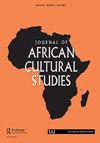Rethinking Agency in Kenyan Animal Conservations: Ng’ang’a Mbugua’s Terrorists of the Aberdare
IF 0.9
2区 社会学
Q2 CULTURAL STUDIES
引用次数: 2
Abstract
ABSTRACT Species loss is a feature of the development intentions of post-colonial countries like Kenya. Kenya like other postcolonial regimes has often linked wildlife conservation with development agendas. The value of wildlife to post-development aims is evident in the approach taken by state-backed conservation efforts as well as in the language used. Thus, wildlife designates a category of animals that are also capital for the tourism industry, state property and a national resource. However, this is complicated when an animal causes harm to some people leading to the animal being seen as a nuisance. In this article I engage with the agency of language in creating the “problem animal” phenomenon in the context of Kenya's post-independence development agenda. I make my case with a close reading of Ng’ang’a Mbugua’s novella Terrorists of the Aberdare (2009). I argue that literary scholarship’s attention to subjectivity and empathy enables new ways of imagining human-animal engagement.肯尼亚动物保护的反思机构:Ng 'ang 'a Mbugua的阿伯代尔恐怖分子
物种流失是肯尼亚等后殖民国家发展意图的一个特点。肯尼亚和其他后殖民政权一样,经常将野生动物保护与发展议程联系起来。野生动物对后发展目标的价值体现在国家支持的保护工作所采取的方法以及所使用的语言中。因此,野生动物指定了一类动物,也是旅游业的资本、国有财产和国家资源。然而,当一只动物对一些人造成伤害,导致该动物被视为公害时,这就变得复杂起来。在这篇文章中,我参与了在肯尼亚独立后发展议程背景下创造“问题动物”现象的语言代理。我细读了昂阿?姆布加的中篇小说《阿伯代尔的恐怖分子》(2009),以此来证明我的观点。我认为,文学学术对主体性和同理心的关注为想象人类与动物的互动提供了新的方式。
本文章由计算机程序翻译,如有差异,请以英文原文为准。
求助全文
约1分钟内获得全文
求助全文
来源期刊

Journal of African Cultural Studies
Multiple-
CiteScore
1.70
自引率
10.00%
发文量
13
期刊介绍:
The Journal of African Cultural Studies publishes leading scholarship on African culture from inside and outside Africa, with a special commitment to Africa-based authors and to African languages. Our editorial policy encourages an interdisciplinary approach, involving humanities, including environmental humanities. The journal focuses on dimensions of African culture, performance arts, visual arts, music, cinema, the role of the media, the relationship between culture and power, as well as issues within such fields as popular culture in Africa, sociolinguistic topics of cultural interest, and culture and gender. We welcome in particular articles that show evidence of understanding life on the ground, and that demonstrate local knowledge and linguistic competence. We do not publish articles that offer mostly textual analyses of cultural products like novels and films, nor articles that are mostly historical or those based primarily on secondary (such as digital and library) sources. The journal has evolved from the journal African Languages and Cultures, founded in 1988 in the Department of the Languages and Cultures of Africa at the School of Oriental and African Studies, London. From 2019, it is published in association with the International African Institute, London. Journal of African Cultural Studies publishes original research articles. The journal also publishes an occasional Contemporary Conversations section, in which authors respond to current issues. The section has included reviews, interviews and invited response or position papers. We welcome proposals for future Contemporary Conversations themes.
 求助内容:
求助内容: 应助结果提醒方式:
应助结果提醒方式:


